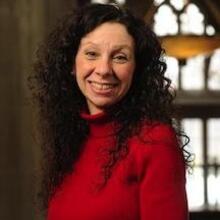"Seventy times seven."
So Christ answers Peter’s question, “Lord, how often shall my brother sin against me and I forgive him?” Scripture does not record Peter’s reaction, but we can guess it was surprise and, perhaps, consternation. Forgiveness does not come easily to human beings.
Christ practices what he preaches. He forgives endlessly in the Gospels—the woman taken in adultery, his own disciple who denies him three times, even his executioners. Regarding this last instance, I have often wondered whether his mother felt the same way.
This question, “How does one practice forgiveness when her child has been murdered,” has haunted me these past few months. We have witnessed the very public deaths of several black men in the media: Michael Brown, Eric Garner and Walter Scott, among others. In interviews with journalists, grieving parents are often asked whether they forgive their son’s killers, and some actually say yes. As the mother of three sons, this evokes in me equal parts amazement and admiration. I don’t think I could be so generous in their circumstances—and I pray I never have to find out.
This troubling question is addressed with exquisite attention in a recent film made by Gayla Jamison, “In Our Son’s Name.” The film offers an intimate glimpse into the lives of Phyllis and Orlando Rodriguez, whose son, Gregory, was killed in the terrorist attack on the Twin Towers on Sept. 11, 2001. It is a poignant account of the journey they make as they come to terms not only with the loss of their son but also with the world-altering events that take place in response to his death. Orlando, a professor of sociology at Fordham University, wrote a letter to The New York Times in the early days after Greg’s death. “Our son Greg is among the many missing from the World Trade Center attack. We cannot pay attention to the daily flow of news about this disaster. But we read enough of it to sense that our government is heading in the direction of violent revenge, with the prospect of sons, daughters, parents and friends in distant lands dying, suffering, and nursing further grievances against us. It is not the way to go. It will not avenge our son’s death. Not in our son’s name.”
Galvanized by the horror of a war that will lead to more deaths of more sons and daughters, to more grieving parents, Orlando and Phyllis devote themselves to the challenge of forgiveness and reconciliation, choosing peacemaking over rage and revenge. Jamison’s film faithfully follows them along this difficult path, illuminating it as both a terrible struggle and a source of freedom and empowerment. Among the most remarkable of their actions is Phyllis’s befriending of Aicha el-Wafi, the mother of the 9/11 conspirator Zacarias Moussaoui. The sight of another mother’s suffering as her son is arrested, tried and threatened with the death penalty—and remembering her own lost son’s youthful rebelliousness and episodes of poor judgment—Phyllis seeks out the mother of her supposed enemy and stands in solidarity with her. Both Phyllis and Orlando eventually testify at Moussaoui’s trial, playing a definitive role in the court’s decision to spare his life.
Among the many powerful moments in the film is a scene in which the Rodriguezes visit a prison and participate in a conversation with the chaplain and several young men incarcerated for committing violent crimes. As these inmates tell their stories, it becomes evident that the one thing they all desire is forgiveness from the families of those they have harmed—something that few of them, if any, have received. They are as much imprisoned by the pain of being unforgiven as by the concrete block walls and iron bars that surround them.
As Orlando and Phyllis listen to them with great compassion, I was struck by the power of forgiveness to set the soul free. To practice forgiveness frees the giver, and to receive forgiveness frees the sinner. Neither the Rodriguez family nor the convicts can undo the past. But forgiveness could make the present bearable and make life livable again.
Perhaps this is what the parents of those young men killed by police know and what all parents who lose a child instinctively seek. Perhaps forgiveness is given—and received—in the name of the daughter, in the name of the son.
“Seventy times seven,” Christ said, along with other inconceivable blessings. “Love your enemies.” “Do good to those who hate you.” “Blessed are the peacemakers: for they will be called children of God.”








